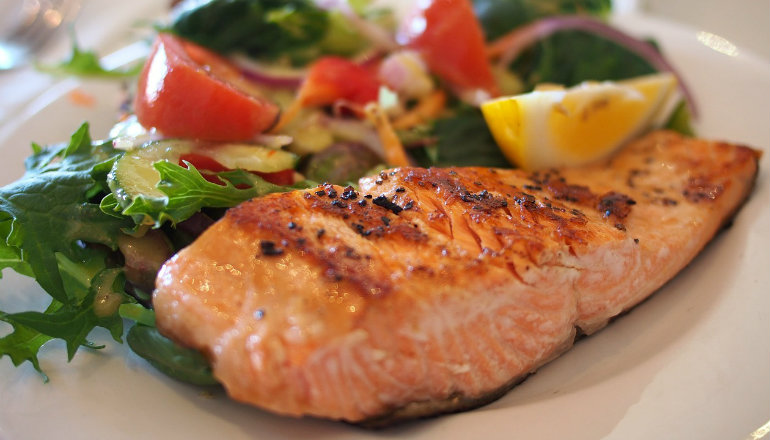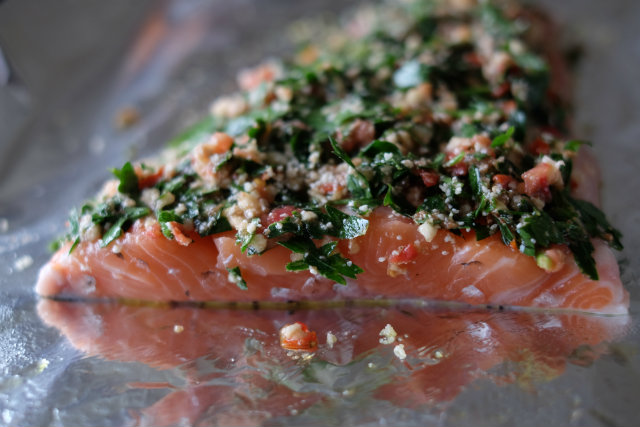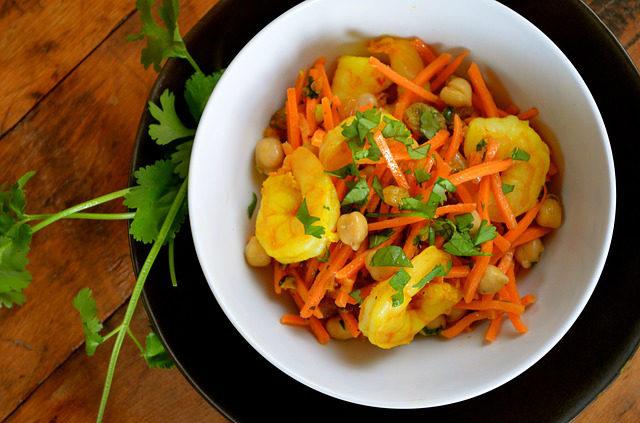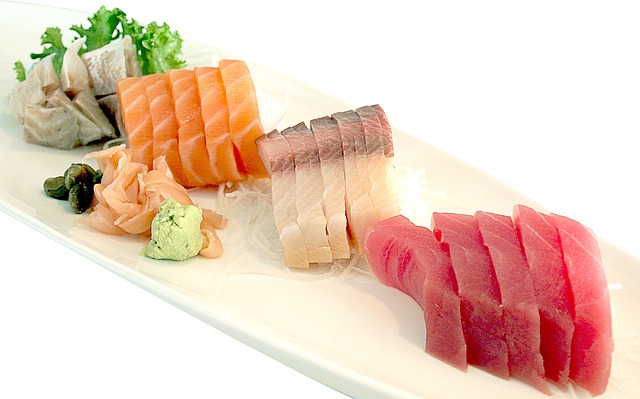
Are you tired of eating the same egg scramble for breakfast, chicken for lunch, and pork chops for dinner?
You care about your nutrition, but you’re bored with the same meals day after day.
But what other choices do you have for your healthy protein sources?
Before I answer that question (and I have a bunch of answers for you), let’s take a quick look at why protein is such an important component to our diet anyway.
Why You Need Healthy Protein Sources
Whether you eat enough of it or not, more than 10,000 different types of protein are already found inside you. Protein is in your bones, muscles, tissue, hair, skin, and nearly every other part of your body. Here are a few things protein does:
- Builds and repairs tissues
- Improves mood and anxiety
- Promotes healthy brain function
- Protects your cardiovascular system
- Boosts muscle mass
- Promotes longevity
Additionally, it has been proven that high-protein diets aid those who are struggling with being overweight and obese in the following ways:
- Increases the body’s ability to burn fat
- Increases satiety
- Decreases subsequent calorie-intake by the body
All of this helps lead to ultimate weight loss.
So, before you skip the boring chicken breast, instead try putting a little adventure into your protein choices. Consider these eight tasty proteins – some you may have never tried, and others you just may have forgotten about.

1. Duck
In China, France, and many other countries, duck is a featured menu item. In the United States, it’s not nearly as popular as other poultry, but it should be. Duck meat is packed with protein, B vitamins, iron, zinc, and selenium. Three ounces of duck meat, without the skin, has 16 grams of protein, and only 4 grams of fat. That’s not all. Duck also has 15% of your recommended amount of riboflavin, 23% thiamin, and 21% of iron.
2. Salmon
One of the most popular fishes in American restaurants and homes, salmon is most well-known for being full of omega-3 fatty acids. Why does your diet need omega-3s? Here’s a sample of what they do for your body:
- Lower your risk of developing cardiovascular disease
- Lower your risk for depression and boost the effects of antidepressants
- Reduce symptoms of ADHD
- Improve joint pain and stiffness and boost
- Lower inflammation
- Reduce the effects of asthma
- Improve lung function
- Develop visual and neurological development in infants
- May help prevent Alzheimer’s disease and dementia.

Furthermore, a three-ounce serving of sockeye or Atlantic salmon provides a whopping 24 grams of protein. It also provides the following essential vitamins and minerals:
- 45% of daily vitamin B12
- 44% of daily selenium
- 35% of daily vitamin B6
- 33% of daily niacin
- 19% of daily riboflavin
Salmon is simple to obtain at most grocery stores and can be purchased fresh at the seafood counter, frozen, or canned. It is also a common fish used in sushi. Salmon fillets can be grilled, baked, or lightly fried in a pan on the stove. Canned salmon is a more economical option and is great for making salmon patties, dips, salads, and more.
When shopping for salmon, you should avoid farmed salmon, but wild-caught Alaskan is recommended. Alternatively, Seafood Watch recommends these guidelines.
Try our recipe for Herb, Tomato, and Nut-Crusted Baked Salmon.
3. Venison
This classic game meat is richer in nutrients than your standard store-bought red meat. It is high in thiamine, iron, essential amino acids, zinc, riboflavin, and niacin, and it’s low in fat. White tail deer contains 26 grams of protein and only 3 grams of fat in each serving. Mule deer, another popular variety of venison, typically contains 24 grams of protein and 1.3 grams of fat.

Venison can be prepared like the red meat you’re used to, but often people have the best experience by mixing it with more conventional meats. So get your hands on some ground venison and try a fifty-fifty venison-beef burger. We’re willing to bet your family will just think you’ve made some awesome burgers and not even know you’ve totally upped their nutrition “game.”
4. Sardines
Perhaps a favorite of your grandfather or grandmother, sardines are often cast aside because they tend to have a pungent odor. They’re also canned whole, which means when you eat them, you eat them head, tail, and all.
Still, if you can get over the initial shock, sardines are an amazingly nutritious food. Not only do they provide the same nutritional benefits as the other fish on this list (omega-3 fatty acids, vitamin B12, riboflavin, and vitamin D), but they’re also a great source of protein. One small sardine has 3 grams of protein. Eat four or five on a piece of toast, and that’s roughly half your required protein for the day.
If you’re new to sardines, don’t be scared off when it comes to cooking with them. Start by checking out this post on how to “eat sardines like an adult.” They’re great in salads, in pasta, and of course, on pizza.
5. Shrimp
What they lack in size, they more than make up for in protein. Three ounces of shrimp, a typical serving size, contains 20 grams of protein and a dozen broiled or baked shrimp will only set you back 85 calories. They also contain many nutrients and essential minerals, like selenium, vitamin D, vitamin B12, choline, iodine, and copper.

Doctors and nutritionists used to warn people about shrimp because they’re high in cholesterol. While this is true, shrimp has 189mg of cholesterol per serving, experts now say shrimp is good, not bad for your heart. If broiled, steamed, or baked, shrimp can increase your levels of HDL, often referred to as “good cholesterol.”
Try our recipe for Pumpkin Apple Curry with Shrimp.
6. Eggs
Everyone can benefit from eggs as a key source of protein (one egg has ~5.5 grams of protein) as well as other nutrients. What’s novel is to consider eating eggs even when it’s not breakfast time.
In terms of nutrition, eggs are lauded for their high levels of cartenoids, which protect against inflammation as well as macular degeneration, a leading cause of blindness. They are also a rich source of choline, which has been proven to boost brain health and may help prevent Alzheimer’s disease.
Furthermore, a Texas A&M study concluded that the cholesterol in eggs may aid muscle growth. The study found that subjects who were on a weight-lifting program and consuming three whole eggs each day gained two times as much muscle as those who did not eat eggs.
Eggs also:
- Enhance memory
- Provide essential iron for health red blood cells
- Improve brain, heart, and eye health with essential omega-3 fatty acids
Finally, eggs are well-tolerated by all ages, inexpensive, and work great in a number of meals. Try them in sandwiches, salads, burritos, quiches, omelets, soups, and even desserts.

7. Bison
It’s leaner than beef and a high in vitamin B12, zinc, protein, and iron. Bison are typically grass-fed, and their more nutritious diet translates to more nutritious meat for us bison consumers. According to the United States Department of Agriculture (USDA), a four-ounce serving of grass-fed bison contains approximately:
- 124 calories
- 6g fat
- 17g protein
- 1.7mg vitamin B12
- 3.9mg zinc
- 4.5mg niacin
- 2.3mg iron
Bison tastes similar to beef and can easily be used in burgers, meatloaf, and other meals typically made with red meat.
8. Tuna
And finally, another excellent seafood source of protein. Tuna contains all of the key benefits that can be found in other fish like salmon (omega-3 fatty acids, vitamin B12, riboflavin, and vitamin D), and it may lower your risk for Alzheimer’s disease, depression, and stroke. Tuna is also a great option for those looking to control their blood pressure and boost their immune system.
For those on a budget, canned tuna is an excellent source of essential nutrients. Or, for a pseudo-beef steak taste, try tuna steaks made with yellowfin tuna. Purchase the steaks fresh or frozen, and bake them in the oven or cook them on the stove. Finally, raw tuna is often a key ingredient in fresh sushi.

A common worry associated with the consumption of tuna is the over-consumption of mercury, which is commonly found in this fish. Even though it is true there is a limit to how much tuna you should consume on a weekly and monthly basis, a Harvard School of Public Health study found that the benefits of eating fish (including tuna) far outweigh the risks. It’s also important to note that white tuna has more mercury than canned light tuna.
Try our recipe for Moroccan Tuna Veggie Scramble.
Finding the Right Healthy Protein Sources for Your Meals
With all these new options for healthy protein sources at your fingertips, it should be a lot easier for you to eat adequate amounts and even enjoy it. Of course, it must be noted that extremely high-protein diets like Atkins and South Beach can present their own risks, including kidney issues, osteoporosis, and high cholesterol.
The ultimate goal, therefore, is to eat a moderate amount of protein. Harvard Medical School sets the recommended daily allowance (RDA) for protein at “0.8 grams of protein per kilogram of body weight.” Use this calculator from the USDA to see how much protein you require based on your sex, age, height, weight, and activity level.
And once again, make sure you’re getting your protein from a variety of sources. Eggs, chicken, and pork chops are certainly qualified sources, but changing up these staples for some of the diverse protein sources we’ve listed above will make for a much healthier diet overall.
Plus, you’ll probably enjoy your meals a lot more.



































